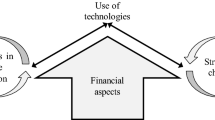Abstract
The paper explores the extent to which social capital is advantageous to small and medium enterprise (SME) growth. Social capital is a communal property involving civic engagement, associational membership, high trust, reliability and reciprocity in social networks. It is capable of being identified in social, political and economic contexts, often associated with strong communities. However, not all strong communities exert the effects of social capital in respect of business activities. This paper assesses government programmes to promote collaboration amongst SMEs for improving innovation capacity by increasing social capital through networking. It shows that, for a sizeable proportion of programme-funded firms in Denmark, Ireland and Wales (U.K.) social capital building was associated with enhanced business, knowledge and innovation performance. Of particular importance was the opportunity afforded to firms for linkage with external innovation networks, and the build-up of embeddedness, or the institutional basis for the enhancement of social capital. As a consequence of discovering the advantages of social capital, over a third of respondents planned to continue to develop it in future, in many cases funding such activities privately rather than calling on the public purse.
Similar content being viewed by others
References
Bourdieu, P. and L. Wacquant, 1992, Invitation to Reflexive Sociology, Chicago: University of Chicago Press.
Branscomb, L. and J. Keller (eds.), 1998, Investing in Innovation, Cambridge MA: MIT Press.
Burt, R., 1992, Structural Holes: The Social Structure of Competition, Cambridge MA: Harvard University Press.
Cohen, W. and D. Levinthal, 1989, 'Innovation and Learning: The Two Faces of R & D', The Economic Journal 99, 569–596.
Coleman, J., 1990, Foundations of Social Theory, Cambridge MA: Harvard University Press.
Cooke, P., 1996, 'The New Wave of Regional Innovation Networks: Analysis, Characteristics and Strategy', Small Business Economics 8, 159–171.
Cooke, P. and K. Morgan, 1998, The Associational Economy: Firms, Regions and Innovation, Oxford: Oxford University Press.
Cossentino, F., F. Pyke and W. Sengenberger, 1996, Local and Regional Response to Global Pressure: The Case of Italy and Its Industrial Districts, Geneva: International Institutefor Labour Studies.
Crevoisier, O., 1997, 'Financing Regional Endogeneous Development: The Role of Proximity Capital in the Age of Globalization', European Planning Studies 5, 407–416.
Dosi, G., 1988, 'Sources, Procedures and Microeconomic Effects of Innovation', Journal of Economic Literature 36, 1126–1171.
Edquist, C. (ed.), 1997, Systems of Innovation, London: Pinter.
Flora, J., J. Sharp and C. Flora, 1997, Entrepreneurial Social Infrastructure and Locally Initiated Economic Development in the Non-metropolitan United States', Sociological Quarterly 38, 623–645.
Florida, R., 1995, 'Towards the Learning Region', Futures 27, 527–536.
Fountain, J., 1998, 'Social Capital: A Key Enabler of Innovation', in L. Branscomb and J. Keller (eds.), Investing in Innovation, Cambridge, MA: MIT Press, pp. 85–111.
Fukuyama, F., 1995, Trust: The Social Virtues and the Creation of Prosperity, New York: The Free Press.
Grabher, G. (ed.), 1993, The Embedded Firm, London: Routledge.
Grande, E. and R. Peschke, 1997, 'Missing Links: Transnational Cooperation and Policy Networks in European Science Policy-Making', Working Paper No.6, Technical University, Munich.
Granovetter, M., 1985, 'Economic Action and Social Structure: The Problem of Embeddedness', American Journal of Sociology 91, 481–510.
Hanifan, L., 1920, The Community Center, Boston: Silver, Burdette and Co.
Jacobs, J., 1961, The Life and Death of Great American Cities, New York: Random House.
Johannisson, B., O. Alexanderson, K. Nowicki and K. Senneseth, 1994, 'Beyond Anarchy and Organization: Entrepreneurs in Contextual Networks', Entrepreneurship and Regional Development 6, 329–356.
Lazaric, N. and E. Lorenz (eds.), 1998, Trust and Economic Learning, Cheltenham: Edward Elgar.
Leonard, D. and S. Sensiper, 1998, 'The Role of Tacit Knowledge in Group Innovation', California Management Review 40, 112–132.
Loury, G., 1977, 'A Dynamic Theory of Racial Income Differences', in P. Wallace and A. La Mond (eds.), Women, Minorities and Employment Discrimination, Lexington, MA: Heath, pp. 153–186.
Malecki, E. and P. Oinas (eds.), 1999, Making Connections: Technological Learning and Regional Economic Change, Aldershot: Ashgate.
NESC, 1996, Networking for Competitive Advantage, Dublin: National Economic and Social Council.
North, D., 1993, 'Institutions and Economic Performance', in U. Mäki, B. Gustafsson and C. Knudsen (eds.), Rationality, Institutions and Economic Methodology, London: Routledge, pp. 242–264
OECD, 1996, Networks of Enterprises and Local Development, Paris: Organization for Economic Cooperation & Development.
Polanyi, K., 1944, The Great Transformation, Boston: Beacon.
Portes, A., 1998, 'Social Capital: Its Origins and Applications in Modern Sociology', Annual Review of Sociology 24, 1–24.
Putnam, R., 1993, Making Democracy Work, Princeton: Princeton University Press.
Schuller, T. and J. Field, 1998, 'Social Capital, Human Capital, and the Learning Society', Journal of Lifelong Education 17, 226–235.
Spender, J., 1996, 'Competitive Advantage from Tacit Knowledge? Unpacking the Concept and Its Strategic Implications', in B. Moingeon and A. Edmondson (eds.), Organizational Learning and Competitive Advantage, London: Sage.
Staber, U., N. Schaefer and B. Sharma (eds.) 1996, Business Networks: Prospects for Regional Development, Berlin: Walter de Gruyter.
Storey, D. and P. Johnson, 1987, Job Generation and Labour Market Change, Basingstoke: Macmillan.
Varaldo, R. and L. Ferrucci, 1996, 'The Evolutionary Nature of the Firm within Industrial Districts', European Planning Studies 4, 27–34.
Woolcock, M., 1998, 'Social Capital and Economic Development: Towards a Theoretical Synthesis and Policy Framework', Theory and Society 27, 151–208.
World Bank, 1997, 'Social Capital: The Missing Link?', in Expanding the Measure of Wealth: Indicators of Environmentally Sustainable Development, Washington DC: The World Bank.
Author information
Authors and Affiliations
Rights and permissions
About this article
Cite this article
Cooke, P., Wills, D. Small Firms, Social Capital and the Enhancement of Business Performance Through Innovation Programmes. Small Business Economics 13, 219–234 (1999). https://doi.org/10.1023/A:1008178808631
Issue Date:
DOI: https://doi.org/10.1023/A:1008178808631




